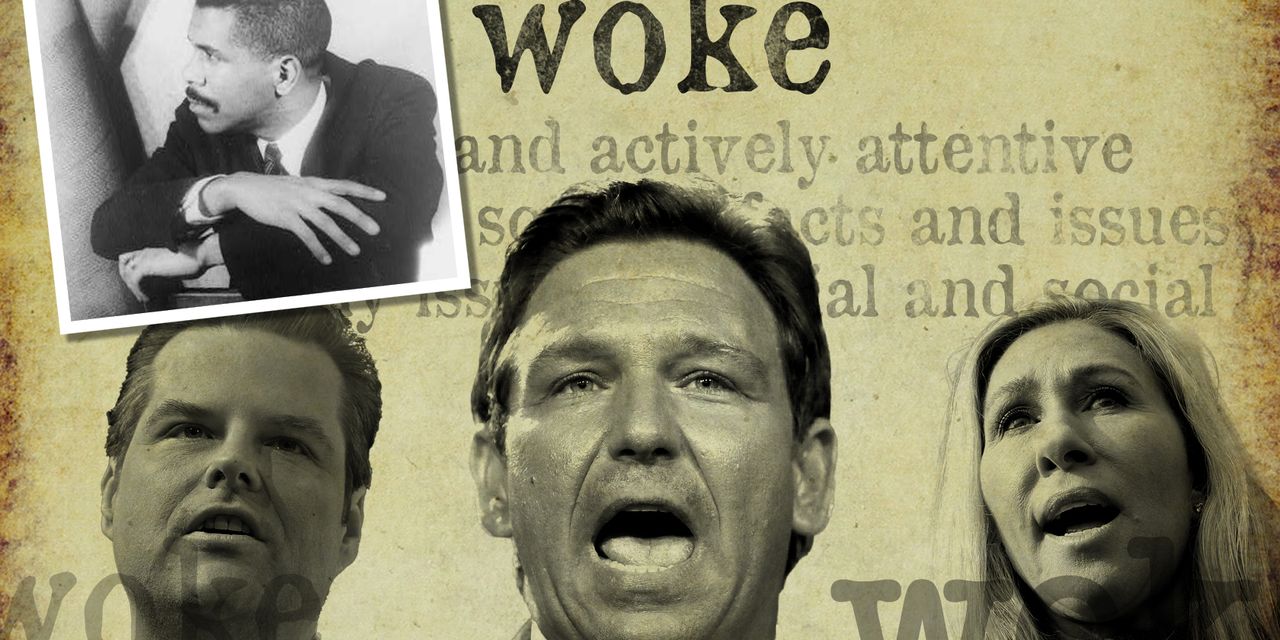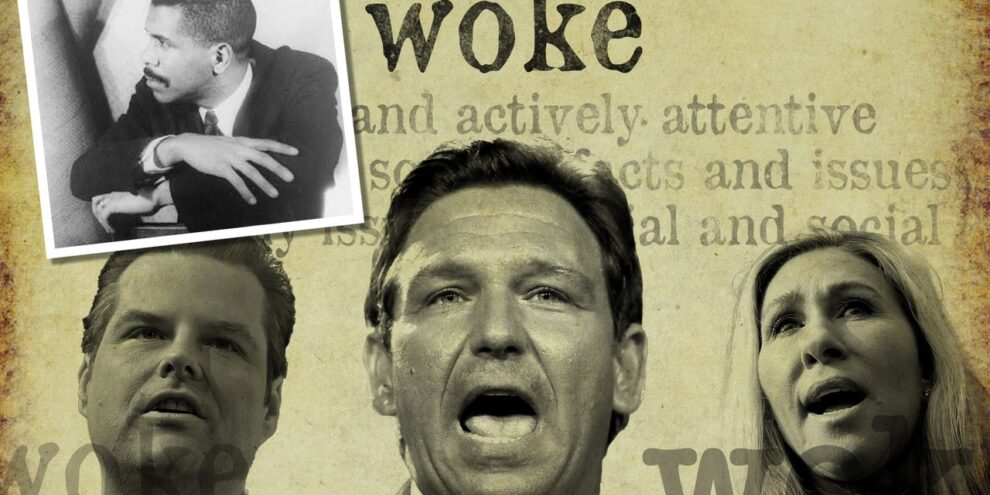
“‘Woke’”
Easily, or perhaps coherently, defining this four-letter word — which feels even shorter when stripped of vital context — stumped a political commentator this week.
Bethany Mandel had even co-written a book on “wokeism” and what she believes is the negative influence of far-left politics on children in American schools. Mandel, a conservative cultural commentator and columnist whose Twitter profile says she homeschools, titled that book “Stolen Youth: How Radicals Are Erasing Innocence and Indoctrinating a Generation.”
But after Mandel herself suggested in a web interview with the Hill’s “Rising” that many African Americans “consider themselves liberal, but fewer consider themselves woke,” she struggled to answer when co-host Briahna Joy Gray asked her to define what “woke” means to her. And that struggle went viral.
iframe { position: absolute; left: 0; top: 0; width: 100%; height: 100%; }
]]>
Mandel, suggesting that on-air jitters and the sleep deprivation of a working mom with young kids played a part, later tweeted her book’s definition.
In actuality, “woke” is a decades-old, sometimes casually used, bit of Black American vernacular. But given its widespread, often lazy interjection in political, cultural and ironic use cases today, “woke” has both too many definitions and nowhere near enough examples that elevate it, or at least cushion it, in fair context.
Or is it simply that “woke” is a tidier natural evolution from “cancel culture” and “political correctness“?
There has been an official response in word world. The Oxford English Dictionary has extended the definition of “woke” as not only a verb but now an adjective.
“I wish it would just go away. Black people essentially stopped using ‘woke’ awhile ago, unless maybe using it with a side-eye,” photographer Jessica Kelley, the daughter of the late novelist and essayist William Kelley, told MarketWatch.
The senior Kelley, known for “A Different Drummer” and other works, addressed co-opted cultural language in a 1962 New York Times essay, “If You’re Woke, You Dig It.” In it, the then-Harlem-based author pointed out that much of what passed for “beatnik” slang (“dig,” “chick,” “cool”) originated with African Americans. (Here’s a recent podcast from Elijah Watson looking at Kelley’s writing legacy and an exploration of “woke” origins.)
“That piece was more prophetic, it turns out, than even my dad could have imagined,” Kelley said in an interview. She recalled the author using the term maybe one additional time, in a novel, and in the context of a relationship, not politics.
To her, “woke” is perhaps just the latest, though admittedly widespread, example of language appropriation that is a subset of cultural appropriation. New users “make fun of it at first, ridicule it, and then it’s part of the public language,” she said. “Eventually, it’s turned into something else and used out of context.”
To a large extent, “woke” has been appropriated mostly by right-wing politicians and commentators to denote programs, policies and priorities they don’t like, such as inclusive education — and, perhaps more surprisingly, actions by the Walt Disney Co. DIS, -1.16% and even the FBI and the U.S. military.
There are variations on the word itself. At the Republican National Convention in 2020, Rep. Matt Gaetz, a Florida Republican, raised alarm over American “woketopians,” grouping them with socialists and supporters of then–Democratic presidential candidate Joe Biden.
iframe { position: absolute; left: 0; top: 0; width: 100%; height: 100%; }
]]>
Florida Gov. Ron DeSantis, an anticipated Republican presidential contender in 2024, said earlier this year that his state would “never surrender to the ‘woke’ mob” as he said state pension-fund money would be removed from the world’s largest fund firm, BlackRock, to avoid environmental, social and governance, or ESG, investments. Texas Gov. Greg Abbott, a fellow Republican, has also publicly announced his desire to stop “a woke agenda” by ordering state agencies to eliminate diversity-driven hiring.
On some programs on Fox News, whose parent Fox Corp. shares common ownership with MarketWatch publisher Dow Jones’s parent, News Corp, outrage over a purported “gas-stove ban” gave way to “woke” mobs coming to rip those appliances out of American homes. (Here’s what’s really going on with safety studies around stoves and the incentives offered for a switch to electric.)
And as Wall Street SPX, -1.10% reeled in recent days after the swift demise of Silicon Valley Bank — the biggest American bank failure since the 2008 financial meltdown — some social-media users joined cable-news pundits in pinning the collapse on its socially aware, or “woke,” agenda. It was a claim that prompted an Associated Press fact check.
Related: House Republican crusade against ‘woke’ means subpoenas for former school-board officials
On the political left, to be “woke” in modern terms means to identify as a staunch social-justice advocate but, in particular, one who is in sync with contemporary political concerns. True enough, someone might be labeled that way whether or not they ever claimed such a title.
As might be expected, defensiveness around “wokeness” invites ironic blowback. A 2020 Hulu comedy series — called, what else, “Woke” — attempted to deconstruct the identity politics behind its current use. But the series drew its own criticism for striking an outdated and too-centrist political viewpoint — that is, for not being “woke” enough, as Vox reported.
In fact, one of the term’s earliest uses was in a historical recording of the protest song “Scottsboro Boys” by blues musician Lead Belly, about the 1930s trials of nine Black teens falsely accused of raping two white women. In that recording, it was used to describe staying aware of the potential for racist violence as a Black person in America.
The first time many younger people heard “woke” in its current context was likely during the ascent of the Black Lives Matter movement. In 2014 in Ferguson, Mo., citizens marched nightly to protest the death of Michael Brown, an unarmed Black teenager shot by a white police officer. As they did, social media included an urgency to “stay woke” against police actions and other threats.
It’s also true that culture can be a conveyance of activism, and the other way around. Childish Gambino, the musical stage name of actor Donald Glover, used “woke” in the chorus of 2016’s “Redbone,” a song also featured in the 2017 horror film “Get Out.” And Erykah Badu sings of “staying woke” on “Master Teacher.”
Jessica Kelley stressed her belief that it is important as a nation to keep alive linguistics studies and hold up cultural language, because a lack of understanding means we can use language to separate people and weaponize words.
In the 1940s and ’50s, Americans, especially Black Americans, worked hard to remove all regional or colloquial accents, a practice more relaxed these days. But there’s a great loss in stripping language of cultural significance and forcing change faster than organic, generational shifts might naturally allow.
Increasingly, there’s been an effort to respect African American Vernacular English (AAVE), Kelley added. AAVE, an area of study and a form of linguistics with its own verbs and unique action verbs, derived from English, French, the many African languages and all the influences that shaped the way that the first enslaved Africans brought to the New World created language to bridge their own differences and seek refuge from oppression, she said.
As for “woke” and its legacy, “I’ve given up trying to correct people,” Kelley told MarketWatch. “I mean, if I had a dollar for every time I see it on Twitter and could link to my dad’s works — well, I’d be rich.”











Add Comment